#excerpts pictures
Journal du Voleur, by Jean Genet / Flowered tree

Le vêtement des forçats est rayé rose et blanc. Si, commandé par mon cœur l’univers où je me complais, je l’élus, ai-je le pouvoir au moins d’y découvrir les nombreux sens que je veux : il existe donc un étroit rapport entre les fleurs et les bagnards. La fragilité, la délicatesse des premiers sont de même nature que la brutale insensibilité des autres. Que j'aie à représenter un forçat - ou un criminel - je le parerai de tant de fleurs que lui-même disparaissant sous elles deviendra une autre, géante, nouvelle.
Vol de nuit, by Antoine de Saint-Exupéry / The sea before the sun sets
“Je ne vois plus les cadrans : j'allume.”
Il toucha les contacts, mais les lampes rouges de la carlingue versèrent vers les aiguilles une lumière encore si diluée dans cette lumière bleue qu'elle ne les colorait pas. Il passa les doigts devant une ampoule : ses doigts se teintèrent à peine.
“Trop tôt.”
Pourtant la nuit montait, pareille à une fumée sombre, et déjà comblait les vallées. On ne distinguait plus celles-ci des plaines. Déjà pourtant s'éclairaient les villages, et leurs constellations se répondaient. Et lui aussi, du doigt, faisait cligner ses feux de position, répondait aux villages. La terre était tendue d'appels lumineux, chaque maison allumant son étoile, face à l'immense nuit, ainsi qu'on tourne un phare vers la mer. Tout ce qui couvrait une vie humaine déjà scintillait. Fabien admirait que l'entrée dans la nuit se fît cette fois, comme une entrée en rade, lente et belle.

Why Be Happy When You Could Be Normal? by Jeanette Winterson / Ladder
Our primary meaning [of the word happiness] now is the feeling of pleasure and contentment; a buzz, a zestiness, the tummy upwards feel of good and right and relaxed and alive… you know…
But earlier meanings build in the hap - in Middle English, that is ‘happ’, in Old English, 'gehapp’ - the chance or fortune, good or bad, that falls to you. Hap is your lot in life, the hand you are given to play.
How you meet your 'hap’ will determine whether or not you can be 'happy’.
What the Americans, in their constitution, call 'the right to the pursuit of happiness’ (please note, not 'the right to happiness’), is the right to swim upstream, salmon-wise.

Pursuing happiness, and I did, and I still do, is not all the same as being happy - which I think is fleeting, dependent on circumstances, and a bit bovine.
If the sun is shining, stand in it - yes, yes, yes. Happy times are great, but happy times pass - they have to - because time passes.
The pursuit of happiness is more elusive; it is life-long, and it is not goal-centred.
What you are pursuing is meaning - a meaningful life. There’s the hap - the fate, the draw that is yours, and it isn’t fixed, but changing the course of the stream, or dealing new cards, whatever metaphor you want to use - that’s going to take a lot of energy. There are times when it will go so wrong that you will barely be alive, and times when you realise that being barely alive, on your own terms, is better than living a bloated half-life on someone else’s terms.
The pursuit isn’t all or nothing - it’s all AND nothing. Like all Quest Stories.
Why Be Happy When You Could Be Normal? by Jeanette Winterson / Tree in an abandoned building, Boston
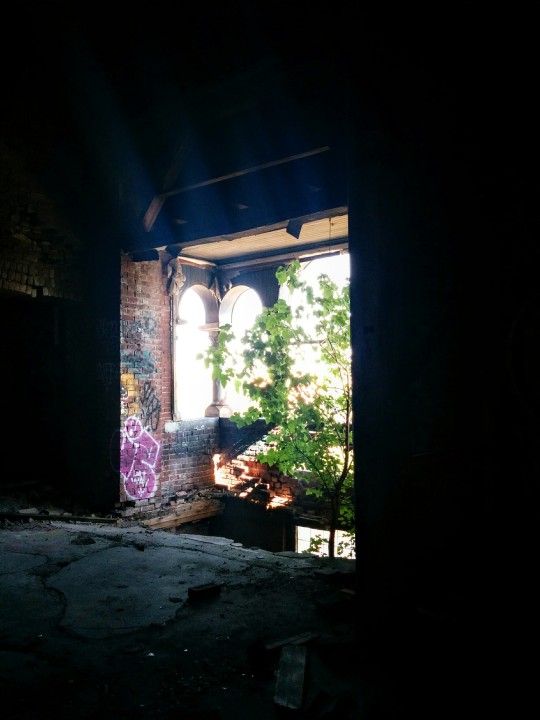
When peope say that poetry is a luxury, or an option, or for the educated middle classes, or that it shouldn’t be read at school because it is irrelevant, or any of the strange things that are said about poetry and its place in our lives, I suspect that the people doing the saying have had things pretty easy. A tough life needs a tough language - and that is what poetry is. That is what literature offers - a language powerful enough to say how it is.
It isn’t a hiding place. It’s a finding place.
Why Be Happy When You Could Be Normal? by Jeanette Winterson / Faded Mural in Essaouira
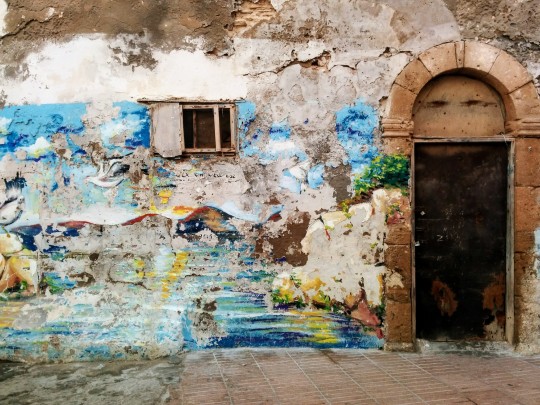
Creative work bridges time because the energy of art is not time-bound. If it were we should have no interest in the art of the past, except as history or documentary. But our interest in art is our interest in ourselves, both now and always. Here and forever. There is a sense of the human spirit as always existing. This makes our own death bearable. Life + art is a boisterous communion/communication with the dead. It is a boxing match with time. I like the line in T. S. Eliot’s Four Quartets - ‘that which is only living/Can only die’. That’s time’s arrow, the flight from womb to tomb. But life is more than an arrow.
The Amazing Adventures of Kavalier & Clay, by Michael Chabon / Seagulls of Essaouira

The newspaper articles that Joe had read about the upcoming Senate investigation into comic books always cited ‘escapism’ among the litany of injurious consequences of their reading, and dwelled on the pernicious effect, on young minds, of satisfying the desire to escape. As if there could be any more noble or necessary service in life.
Down at the Cross (Letter from a Region in My Mind), by James Baldwin / Red Flower
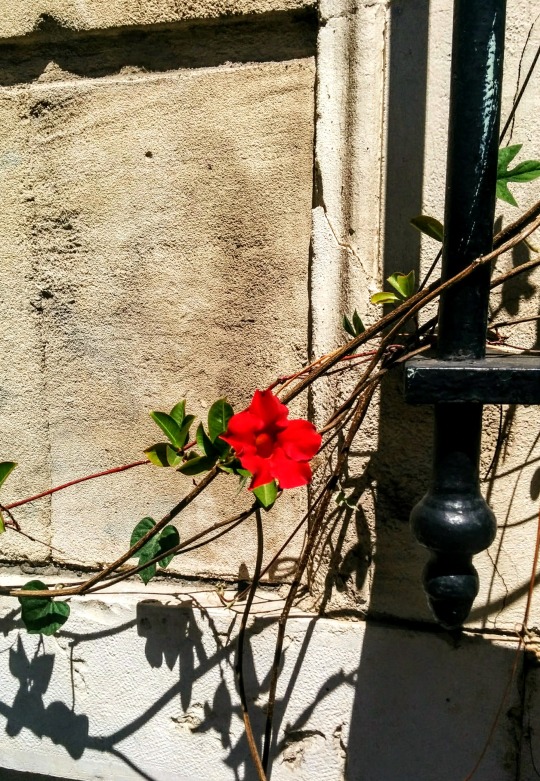
Love takes off the mask that we fear we cannot live without and know we cannot live within. I use the word ‘love’ here not merely in the personal sense but as a state of bring, of a state of grace - not in the infantile American sense of being made happy but in the tough and universal sense of quest and daring and growth.
Titus Groan, by Mervyn Peake / Trinity College’s Library
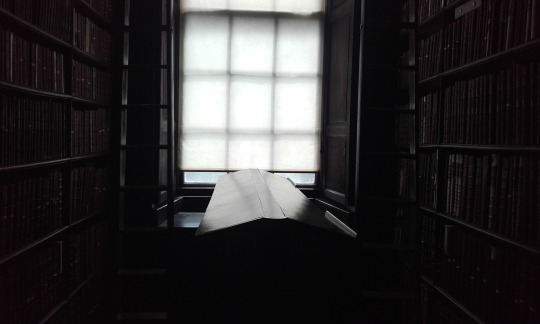
He had brooded long and was about to take a candle that stood ready on a table at his elbow and search for a book more in keeping with his mood than were the essay on his knee, when he felt the presence of another thought that had been empering his former cogitations, but which now stood boldly in his mind. It had begun to make itself felt as something that clouded and disturbed the clarity of his reflections when he had pondered on the purpose and significance of tradition and ancestry, and now with the thought detached from its erudite encumbrances he watched it advance across his brain and appear naked, as when he had first seen his son, Titus.
His depression did not lift; it only moved a little to one side.
Du côté de chez Swann, by Proust / Clouds
Un petit coup au carreau, comme si quelque chose l'avait heurté, suivi d'une ample chute légère comme de grains de sable qu'on eût laissé tombé d'une fenêtre au-dessus, puis, la chute s'étendant, se réglant, adoptant un rythme, devenant fluide, sonore, musicale, innombrable, universelle : c'était la pluie.
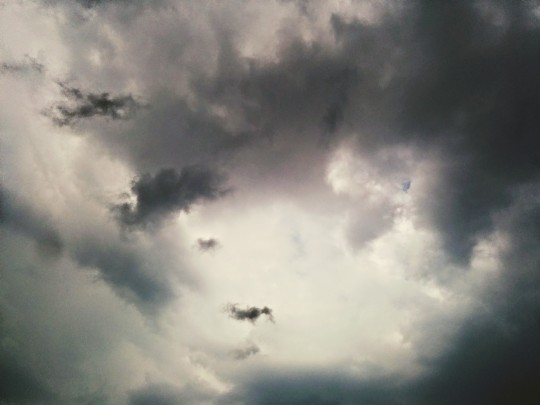
Quand par les soirs d'été le ciel harmonieux gronde comme une bête fauve et que chacun boude l'orage, c'est au côté de Méséglise que je dois de rester seul en extase à respirer, à travers le bruit de la pluie qui tombe, l'odeur d'invisibles et persistants lilas.
